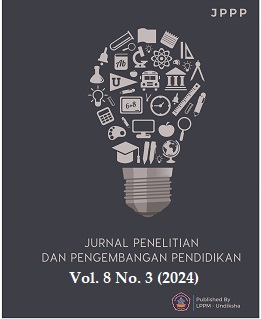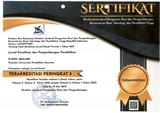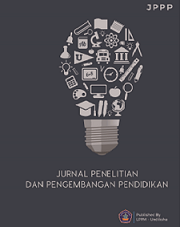Sociomathematical Norm, Mathematical Resilience and Mathematical Representation Ability in Mathematics Learning
DOI:
https://doi.org/10.23887/jppp.v8i3.65238Keywords:
Sociomathematical Norm, Mathematical Resilience, Representation Mathematics, SmartPLSAbstract
The abstract nature of mathematics needs to be represented in various comprehensive representations of mathematics itself. One of the soft skills that can support mathematical representation ability is sociomathematical norm and mathematical resilience. This study aims to analyze the effect of sociomathematical norms and resilience on mathematical representation ability in learning. The method used in this study is quantitative with a correlational design using survey techniques and question model structures. The sample used was 100 junior high school students using proportional random sampling techniques. The mathematical representation ability test instrument consists of 5 test items. Meanwhile, the sociomathematical norm instrument is in the form of a questionnaire with a Likert scale. Data analysis was carried out using structural equation modelling (SEM) with n student t-tests to determine the influence between variables using SmartPLS software. The results of testing the mathematical representation ability instrument, sociomathematical norm and mathematical resilience showed that the indicators on each instrument were said to be valid. The reliability test results showed that all instruments met the reliability requirements. The results of the hypothesis testing show that there is a significant favourable influence of sociomathematical norms on mathematical representation ability, there is a significant favourable influence of mathematical resilience on mathematical representation ability, and there is a significant favourable influence of sociomathematical norms on mathematical representation with mathematical resilience mediation.
References
Ayu, L. S., Moharom, M. I., & Zanthy, L. S. (2020). Analisis Kemampuan Berpikir Kreatif Matematis Siswa SMK dalam Menyelesaikan Soal Open-Ended. MAJU: Jurnal Ilmiah Pendidikan Matematika, 7(1). https://doi.org/10.35334/meta.v5i1.4070.
Chirkina, T., Khavenson, T., Pinskaya, M., & Zvyagintsev, R. (2020). Factors of student resilience obtained from timss and pisa longitudinal studies. Issues in Educational Research, 30(4), 1245–1263.
Fitriani, Herman, T., & Fatimah, S. (2023). Considering the Mathematical Resilience in Analyzing Students ’ Problem- Solving Ability through Learning Model Experimentation. International Journal of Instruction, 16(1), 219–240.
Fitrianna, A. Y., Dinia, S., Mayasari, M., & Nurhafifah, A. Y. (2018). Mathematical Representation Ability of Senior High School Students: An Evaluation from Students’ Mathematical Disposition. JRAMathEdu (Journal of Research and Advances in Mathematics Education), 3(1), 46. https://doi.org/10.23917/jramathedu.v3i1.5872.
Gürefe, N., & Akçakın, V. (2018). The Turkish Adaptation of the Mathematical Resilience Scale: Validity and Reliability Study. Journal of Education and Training Studies, 6(4), 38. https://doi.org/10.11114/jets.v6i3.2992.
Hendriana, H., Sumarmo, U., Carli, C., Ristiana, M. G., & Putra, H. D. (2019). Enhancing students mathematical creative skill and resilience by using problem posing approach. Journal of Physics: Conference Series, 1318(1). https://doi.org/10.1088/1742-6596/1318/1/012065.
Hermanda, A., Sumarwan, U., & Tinaprillia, N. (2019). the Effect of Social Media Influencer on Brand Image, Self-Concept, and Purchase Intention. Journal of Consumer Sciences, 4(2), 76–89. https://doi.org/10.29244/jcs.4.2.76-89.
Hutauruk, A. J. B., & Priatna, N. (2017). Mathematical Resilience of Mathematics Education Students. Journal of Physics: Conference Series, 895(1). https://doi.org/10.1088/1742-6596/895/1/012067.
Hwang, W. Y., Chen, N. S., Dung, J. J., & Yang, Y. L. (2007). Multiple representation skills and creativity effects on mathematical problem solving using a multimedia whiteboard system. Educational Technology and Society, 10(2), 191–212.
Ignacio, N. G., Nieto, L. J. B., & Barona, E. G. (2006). The Affective Domain in Mathematics Learning. International Electronic Journal of Mathematics Education, 1(1), 16–32. https://doi.org/https://doi.org/10.29333/iejme/169.
Jitendra, A. K., Nelson, G., Pulles, S. M., Kiss, A. J., & Houseworth, J. (2016). Is mathematical representation of problems an evidence-based strategy for students with mathematics difficulties? Exceptional Children, 83(1), 8–25. https://doi.org/10.1177/0014402915625062.
Johnston-Wilder, S., & Brindley, J. (2015). Developing Mathematical Resilience In School-Students Who Have Experienced Repeated Failure Developing Mathematical Resilience View project Game-based learning View project. 8th International Conference of Education, Research and Innovation, ICERI2015, November.
Johnston-Wilder, S., Goodall, J., & Almehrz, H. (2018). Overcoming Statistical Helplessness and Developing Statistical Resilience in Learners: An Illustrative, Collaborative, Phenomenological Study. Creative Education, 09(07), 1105–1122. https://doi.org/10.4236/ce.2018.97082.
Kang, S. M., & Kim, M. K. (2016). Sociomathematical norms and the teacher’s mathematical belief: A case study from a Korean in-service elementary teacher. Eurasia Journal of Mathematics, Science and Technology Education, 12(10), 2733–2751. https://doi.org/10.12973/eurasia.2016.1308a.
Karakus, M., Ersozlu, Z., Usak, M., & Ocean, J. (2021). Self-efficacy, affective well-being, and intent-to-leave by science and mathematics teachers: A structural equation model. Journal of Baltic Science Education, 20(2), 237–251. https://doi.org/10.33225/jbse/21.20.237.
Khairiyyah, A., Mulyono, & Fauzi, K. M. A. (2021). The Learning Effect of Blended Learning Based on Google Class Room and Initial Mathematics on Mathematic Representation and Resilience of Students in the Covid-19 Pandemic. Britain International of Linguistics Arts and Education (BIoLAE) Journal, 3(1), 63–76. https://doi.org/10.33258/biolae.v3i1.410.
Kooken, J., Welsh, M. E., Mccoach, D. B., & Johnson-Wilder, Sue and Lee, C. (2013). the Construct of Resilience To the Study of Mathematics . American Educational Research Association (AERA) 2013 Annual Meeting: Education and Poverty: Theory, Research, Policy and Praxis, 27 Apr-1 May 2013.
Lai, C. L., & Hwang, G. J. (2016). A self-regulated flipped classroom approach to improving students’ learning performance in a mathematics course. Computers and Education, 100, 126–140. https://doi.org/10.1016/j.compedu.2016.05.006.
Levasseur, K., & Cuoco, A. (2003). Mathematical Habits of Mind. Proceedings of PME-NA 31, October 2010, 1576–1583.
Maarif, S., & Fitriani, N. (2023). Mathematical Resilience, Habits of Mind, and Sociomathematical Norms By Senior High School Students in Learning Mathematics: a Structured Equation Model. Infinity Journal, 12(1), 117. https://doi.org/10.22460/infinity.v12i1.p117-132.
Maarif, S., Wahyudin, W., Noto, M. S., Hidayat, W., & Mulyono, H. (2018). Geometry Exploration Activities Assisted With Dynamic Geometry Software (Dgs) in a Teacher Education Classroom. Infinity Journal, 7(2), 133. https://doi.org/10.22460/infinity.v7i2.p133-146.
Mahmood, K., & Ghaffar, A. (2014). The Relationship between Resilience, Psychological Distress and Subjective Well- Being among Dengue Fever Survivors. Global Journal of Human-Social Science, 14(10), 12–20.
Minarni, A., Napitupulu, E. E., & Husein, R. (2016). Mathematical understanding and representation ability of public junior high school in North Sumatra. Journal on Mathematics Education, 7(1), 43–56. https://doi.org/10.22342/jme.7.1.2816.43-56.
Monariska, E., & Komala, E. (2020). Resiliensi dan Kemampuan Koneksi Matematik dengan Pembelajaran Berbasis Vark dalam Menyelesaikan Soal pada Mata Kuliah Analisis Vektor. SJME (Supremum Journal of Mathematics Education), 4(1), 101. https://doi.org/10.35706/sjme.v4i1.3149.
Murtafiah, W., Sa’dijah, C., Candra, T. D., Susiswo, & As’ari, A. R. (2018). Exploring the explanation of pre-service teacher in mathematics teaching practice. Journal on Mathematics Education, 9(2), 259–270. https://doi.org/10.22342/jme.9.2.5388.259-270.
Nashrullah, Rizqi, F., Asikin, M., Waluya, B., & Zaenur. (2021). Kemampuan berpikir kritis matematis siswa pada perkembangan era society 5.0. Edukatif : Jurnal Ilmu Pendidikan, 4(2).
Ningsih, A. W., & Maarif, S. (2021). Analysis of Sociomathematical Norms in Mathematics Learning at113 Junior High School. Wacana Akademika: Majalah Ilmiah Kepandidikan, 5(1), 43–53.
Partanen, A. M., & Kaasila, R. (2015). Sociomathematical Norms Negotiated in the Discussions of Two Small Groups Investigating Calculus. International Journal of Science and Mathematics Education, 13(4), 927–946. https://doi.org/10.1007/s10763-014-9521-5.
Renaldy, Y., & Maarif, S. (2022). Analysis Study of Mathematical Representation Skills of High School Students Seen from the Perspective of Sociomathematical Norms. Edumaspul: Jurnal Pendidikan, 6(2), 1856–1866. https://doi.org/10.33487/edumaspul.v6i2.3703.
Rosengrant, D., Etkina, E., & Van Heuvelen, A. (2007). An overview of recent research on multiple representations. AIP Conference Proceedings, 883, 149–152. https://doi.org/10.1063/1.2508714.
Sánchez, V., & García, M. (2014). Sociomathematical and mathematical norms related to definition in pre-service primary teachers’ discourse. Educational Studies in Mathematics, 85(2), 305–320. https://doi.org/10.1007/s10649-013-9516-0.
Saputri, K. D., & Maarif, S. (2022). Analisis Kemampuan Komunikasi Matematis ditinjau dari Sociomathematical Norms. ANARGYA: Jurnal Ilmiah Pendidikan Matematika, 5(2), 2615–4072. https://doi.org/10.24014/juring.v5i2.16856.
Sari, D. P., Darhim, & Rosjanuardi, R. (2018). Errors of students learning with react strategy in solving the problems of mathematical representation ability. Journal on Mathematics Education, 9(1), 121–128. https://doi.org/10.22342/jme.9.1.4378.121-128.
Septian, A., Darhim, & Prabawanto, S. (2020). Geogebra in integral areas to improve mathematical representation ability. Journal of Physics: Conference Series, 1613(1). https://doi.org/10.1088/1742-6596/1613/1/012035.
Syafira, S., Ghifari, A., & Usdiyana, D. (2023). Hubungan Resiliensi Matematis dengan Kemampuan Pemecahan Masalah Matematis Siswa SMA. 2018, 529–535.
Thornton, S., Statton, J., & Mountzouris, S. (2012). Developing Mathematical Resilience among Aboriginal Students. Mathematics Education Research Group of Australasia Incorporated (MERGA), 35, 728–734.
Utami, C. T. P., Mardiyana, & Triyanto. (2019). Profile of students’ mathematical representation ability in solving geometry problems. IOP Conference Series: Earth and Environmental Science, 243(1). https://doi.org/10.1088/1755-1315/243/1/012123.
Utami, P. R., Junaedi, I., & Hidayah, I. (2018). Mathematical representation ability of sudeents’ grade X in mathematics learning on problem based learning. Unnes Journal of Mathematics Education, 7(3), 164–171. https://doi.org/10.15294/ujme.v7i1.25486.
van Zoest, L. R., Stockero, S. L., & Taylor, C. E. (2012). The durability of professional and sociomathematical norms intentionally fostered in an early pedagogy course. Journal of Mathematics Teacher Education, 15(4), 293–315. https://doi.org/10.1007/s10857-011-9183-y.
Wertsch, J. V. (1979). From social interaction to higher psychological processes a clarification and application of vygotsky’s theory. Human Development, 22(1), 1–22. https://doi.org/10.1159/000272425.
Whitney, S., Splett, J. W., & Weston, K. J. (2008). An empirical examination of the Resiliency Wheel. Advances in School Mental Health Promotion, 1(2), 41–48. https://doi.org/10.1080/1754730X.2008.9715727.
Widodo, S. A., Turmudi, Dahlan, J. A., Harini, E., & Sulistyowati, F. (2020). Confirmatory factor analysis sosiomathematics norm among junior high school student. International Journal of Evaluation and Research in Education, 9(2), 448–455. https://doi.org/10.11591/ijere.v9i2.20445.
Wong, K. K. K.-K. (2013). 28/05 - Partial Least Squares Structural Equation Modeling (PLS-SEM) Techniques Using SmartPLS. Marketing Bulletin, 24(1), 1–32.
Xu, S. R., & Zhou, S. N. (2022). the Effect of Students’ Attitude Towards Science, Technology, Engineering, and Mathematics on 21St Century Learning Skills: a Structural Equation Model. Journal of Baltic Science Education, 21(4), 706–719. https://doi.org/10.33225/jbse/22.21.706.
Yackel, E., & Cobb, P. (1996). Sociomathematical norms, argumentation, and autonomy in mathematics. Journal for Research in Mathematics Education, 27(4), 458–477. https://doi.org/10.2307/749877.
Zembat, I. O., Yasa, S. A., & Using, S. A. (2015). International Journal of Education in Mathematics , Science and Technology ( IJEMST ) Using Classroom Scenarios to Reveal Mathematics Teachers ’ Understanding of Sociomathematical Norms To cite this article : Using Classroom Scenarios to Reveal Mathematic.
Zhe, L. (2012). Survey of Primary Students’ Mathematical Representation Status and Study on the Teaching Model of Mathematical Representation. Journal of Mathematics Education, 5(1), 63–76.
Downloads
Published
How to Cite
Issue
Section
License
Copyright (c) 2024 Samsul Maarif Samsul

This work is licensed under a Creative Commons Attribution-ShareAlike 4.0 International License.
Authors who publish with the Jurnal Penelitian dan Pengembangan Pendidikan agree to the following terms:
- Authors retain copyright and grant the journal the right of first publication with the work simultaneously licensed under a Creative Commons Attribution License (CC BY-SA 4.0) that allows others to share the work with an acknowledgment of the work's authorship and initial publication in this journal.
- Authors are able to enter into separate, additional contractual arrangements for the non-exclusive distribution of the journal's published version of the work (e.g., post it to an institutional repository or publish it in a book), with an acknowledgment of its initial publication in this journal.
- Authors are permitted and encouraged to post their work online (e.g., in institutional repositories or on their website) prior to and during the submission process, as it can lead to productive exchanges, as well as earlier and greater citation of published work. (See The Effect of Open Access)








